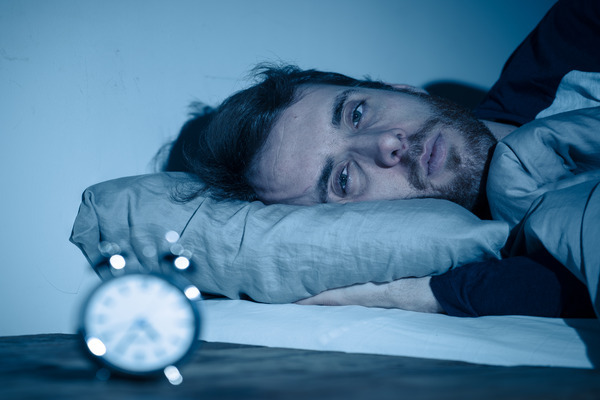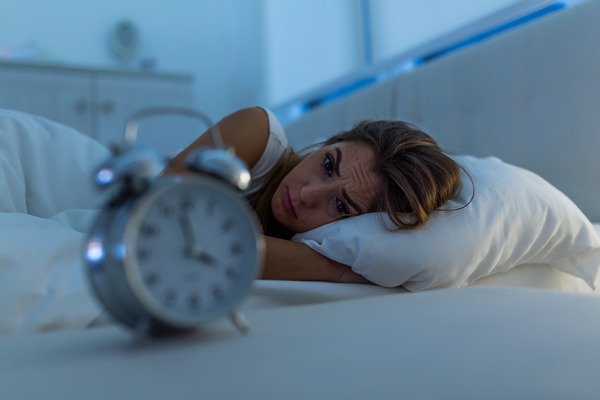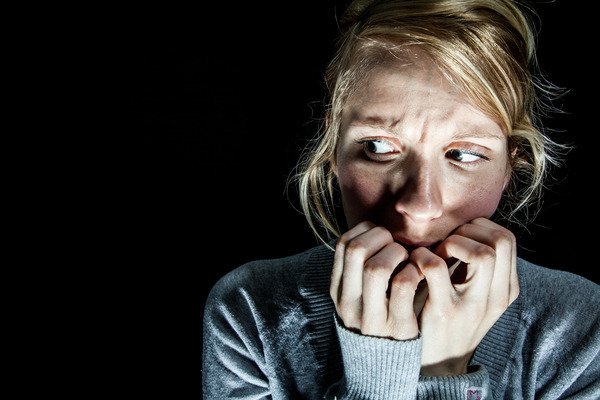What are night terrors? What does it mean to scream in your sleep? Discover how to avoid night terrors in children and adults and the causes of these sleep disorders.
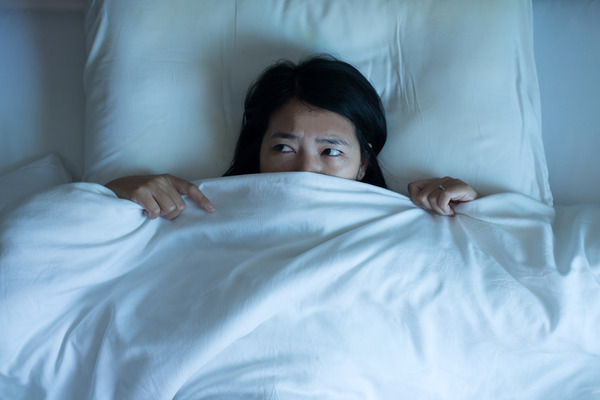
The night terrors, also called night fears, are a sleep disorder that involves people waking up at night with overwhelming feelings of fear. In the vast majority of cases, a night terror does not usually cause harm to those who suffer from it and they end up disappearing on their own. But, sometimes suffering from this nocturnal ‘panic attack’ can be a symptom of a mental health problem.
The first thing we must clarify is that nightmares and night terrors are not the same. In the case of night terrors, emotional discomfort occurs in the individual, in the form of intense fear, and screams and sudden movements that interrupt sleep. Both nightmares and night terrors are classified as Sleep disorders And it can affect children as well as adults.
What are night terrors?
When we refer to night terrors, we are talking about those episodes of intense fear that occur during sleep. Normally, these childhood and adult parasomnias They are usually characterized by agitated movements and vocalizations. In the vast majority of cases, night terrors and age are related, since they are very common in young children. Despite this, night terrors in adults can also occur.
During a night terror People may scream or show other signs of fear. In most cases, these episodes can last several minutes; however, during these nocturnal panic attacks, people generally do not wake up completely.
Although night terrors in children and adults They can be very annoying both for the people who suffer from them and for their families, the reality is that these episodes are not harmful.
Signs of a nighttime panic attack
The first are the symptoms that identify night terrors The subject may get up from bed, sit up, or keep his eyes completely open during an episode.
They may also present alterations in heart rate, sweating, everything is felt and experienced from intense fear. That, in most cases, both in adults and children, the next day they do not remember anything of what happened. It usually occurs in the first moments of sleep, and once overcome, the subject can sleep the rest of the time in a normal way. The symptoms of night terrors They are usually the following.
- Scream in your dreams
- Fast breathing
- accelerated heartbeat
- Excessive sweating (people often see themselves reflected in expressions like ‘I wake up sweating)
- Sitting or getting out of bed
- Having difficulty waking up
- Confusion upon waking
- Aggressive behavior
- Have no memories of the night terror when you wake up
Are childhood or adult parasomnias They are a type of disorder that means a person may appear awake, be confused, or be unable to communicate with others. In the event that night terrors are experienced and they interfere with the daily life of those who suffer from it, it is necessary to go to a professional psychologist.
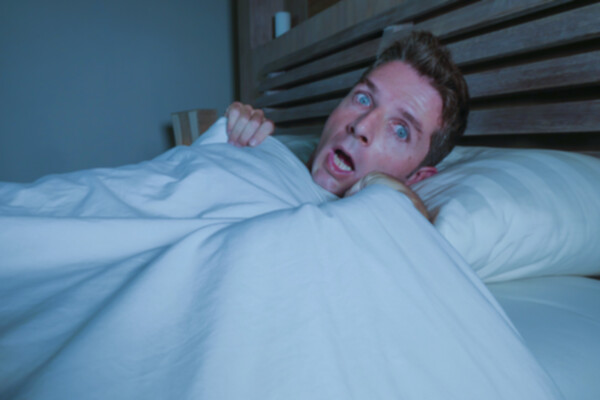
How is a night terror diagnosed?
For diagnose night terrors, will review your medical history and symptoms. The evaluation may include:
- Physical exploration: Your doctor may perform a physical examination to identify disorders that may be contributing to your night terrors.
- Analysis of symptoms: Your doctor may ask you or your partner to complete a questionnaire about your sleep behavior.
- Overnight sleep study (polysomnography): In some cases, your doctor may recommend a study that is done overnight in a sleep laboratory. Sensors are placed on your body that record and monitor your brain waves, blood oxygen level, heart and breathing rates, as well as eye and leg movements while you sleep. You will also be recorded to document your behavior during sleep cycles. This last method is usually used in rarer cases.
Night terrors and their causes
During sleep, the brain goes through a series of stages that are marked by different patterns of activity. According to research night terrors They usually occur when people are moving from one stage of sleep to the next. It is during these moments that a person can wake up slightly and suffer from a night terror.
Although many of the exact causes of night terrors In fact, there are some studies that indicate that nighttime panic attacks may be related to the following.
- Sleep disruption
- Fatigue
- Diseases
- Medications including antidepressants
- Restless leg syndrome
- Excess stress
- Alcoholism
- Trauma
- Certain neurological conditions
In a large part ofs cases of night terrors in adults, these are usually associated with effects on their mental health. For this reason, if you are suffering from a night terror, it is important that you consult with a mental health professional.
What does it mean to scream while you sleep?
If you usually scream in your sleep or wake up screaming repeatedly, it is likely a sign that you are experiencing parasomnia. In these cases, it is important to find out the reason for this affectation and go to a professional psychologist to seek help if this interferes with your sleep patterns.
Nightmares or night terrors
Most people often confuse night nightmares with terrors There is actually a big difference between nightmares and night terrors. Psychologists highlight the following signs to identify if it is a night terror or nightmare.
- People usually wake up when experiencing a nightmare. Instead, during a night terror people never fully wake up.
- The nightmares They are usually remembered by those who experience them. In fact, in some cases people remember them in great detail. As for night terrors, the vast majority of people cannot remember them and if they do, they only recognize certain incomplete fragments.
Which is the treatment?
Generally, no treatment is necessary to night terrors If night terrors lead to possible injury, are disturbing to family members, or cause embarrassment or sleep disruption to the person experiencing them, treatment may be required. Generally, treatment focuses on promoting safety and eliminating causes or triggers.
Treatment options include:
- Treat stress: If he stress or anxiety seem to contribute to the development of night terrors, your doctor may suggest a meeting with a therapist or counselor. Cognitive behavioral therapy, hypnosis, biofeedback, or relaxation therapy may be helpful.
- early awakening: It involves waking up the person who has night terrors about 15 minutes before the time when they usually occur. The person then stays awake for a few minutes before going back to sleep.
- Medicines: Medications are rarely used to treat night terrors, particularly in children. However, if necessary, the use of benzodiazepines or certain antidepressants can be effective.
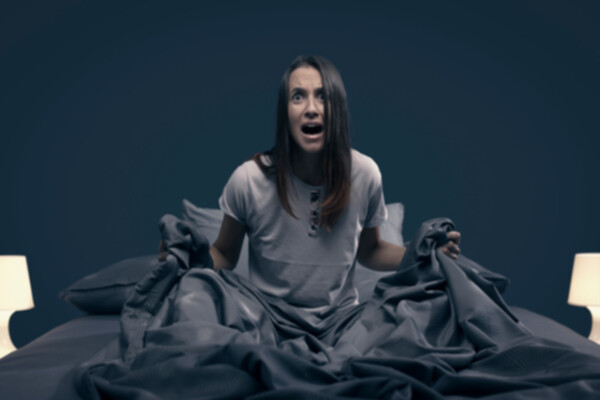
How to prevent night terrors in adults?
There are a series of strategies that we can carry out to try control night terrors In fact, most treatments for night terrors in adults tend to focus on improving sleep hygiene or reducing stress.
Therefore, making various positive changes in our daily habits can help us reduce or even eliminate the symptoms of this condition. Some of the steps you can take to cope night terrors They are the following.
- Establish good sleep habits: Lack of sleep or fatigue tends to increase the chances of experiencing a night terror Therefore, by having a good sleep schedule, people improve their rest and reduce the probability of suffering these nocturnal panic attacks.
- Use relaxation techniques: Due to the stress that experience during a night terror, people can avoid these attacks by trying to reduce the amount of stress they experience in their daily lives. To achieve this, practicing yoga, massages, or deep breathing can be a good method.
- Try scheduled wake-up: This strategy consists of looking for patterns and noting if night terrors They always occur at the same time. If any pattern is detected, the technique based on waking up at the time the night terror is experienced can be applied.
These may be some ways to avoid night terrors in adults Likewise, as we have indicated, it is possible that this condition is related to a mental health illness, so it is important to go to a professional psychologist.
How to avoid night terrors in children?
If your children experience night terrors there are a series of steps that can be followed to help alleviate these nocturnal panic attacks.
- Don’t try to stop the night terror: Although it may be distressing for a parent to see their children suffer from it, it is best not to disturb them when these nighttime fears are happening.
- Create a safe sleeping environment: It is important to try to protect your children from any harm they may cause when they suffer from these night terrors.
- Close and lock doors and windows: In some cases, children may move during night terrors. Therefore, it is important to close both doors and windows.
For both children and adults, it is a recoverable process, with emotional support and security techniques and where the subject progressively disappears, in most cases. sleep disorder





